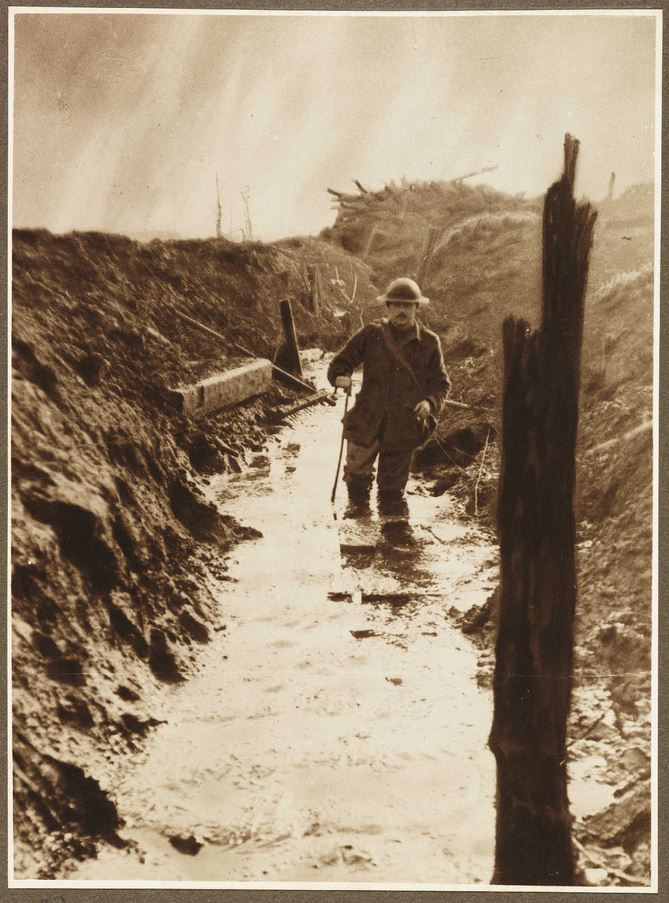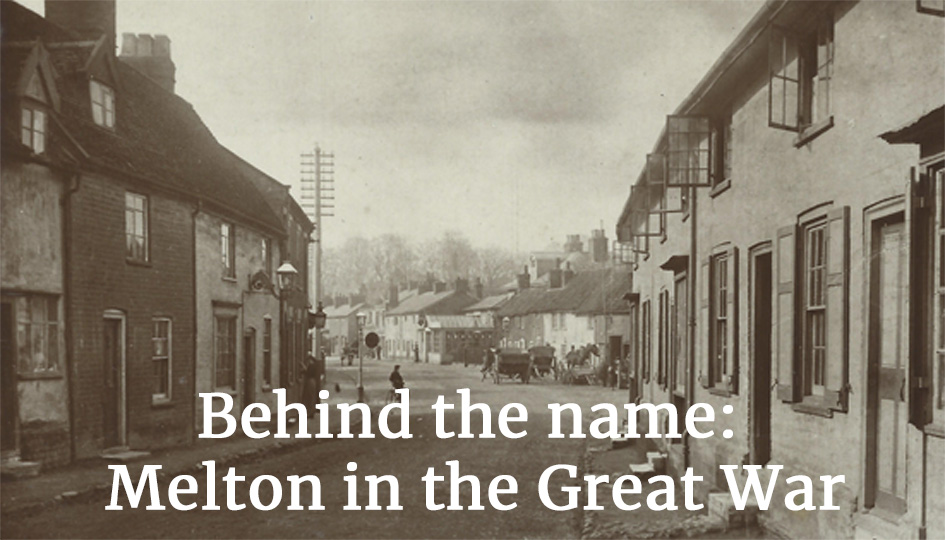Oswald Victor Parkington was born in Melton towards the end of 1893 and baptised at St Andrew’s Church on 7th January 1894. By 1911, he had joined his father at St Audry’s, where he was employed as a weigh clerk.
On 2nd September 1914, a month after war was declared, Oswald enlisted in the 4th (Territorial) Battalion of the Suffolk Regiment, joining them at their training camp in Severalls, near Colchester. In mid-October, the battalion was informed they had been selected for active duty overseas, dependent on whether they could raise enough men, as those in the Territorial Force could only serve overseas if they consented to it. The majority of the men did and so they were sent by train to Southampton, ready to go to France.
On 8th November, they boarded the SS Rossetti, arriving in Le Havre the next day. The 4th Suffolks then marched to Vielle Chappelle where they joined the Jullundur Brigade and became part of the 3rd (Lahore) Division of the Indian Army Corps. By mid-December 1914, the battalion had seen its first front line action and, through the winter to March 1915, Oswald would regularly be in the trenches at the front line.
The Woodbridge Reporter and Wickham Market Gazette published a letter in February 1915 written by Oswald describing what it was like in the trenches:
Oswald Parkington described walking through flooded trenches in a letter home. (Frank Hurley) 
Dear Sir:
I thought it might interest you to know the conditions of the trenches where we happened to be last week. A party of men were picked from our Company (of which I happened to be one) to go up to the firing line. We had to go along a road over your shoe tops in mud and water and then got into a trench up to your knees in water. After ploughing our way through the water a long way, our trench was at last reached and by this time the water was up to your waist. We were posted to our places and there we had to stick nearly 12 hours before being relieved the next morning. We had to hold the trench at all costs, so we were able to amuse ourselves by blazing away at the Germans in front of us and dodging the return packet. We could hear the Germans talking and singing, probably taking the mick out of us poor beggars. I can assure you it was cold comfort as you can imagine, however after what seemed a week our reliefs came next morning much to the delight of the men. We waded (or almost swam) to get back to the road again. Looking on the bright side of the job we had a lovely hot water bath waiting for us and then a warm room where we were served “tommy” and a drop of warm rum which soon put matters right once again. The whole time we were in the village we were under artillery and rifle fire, but one gets used to it out here. It is most heart breaking to see the houses and places with furniture left in, all shelled to atoms; a sight one can never forget. You will also be glad to know that your valuable paper finds its way out to men every week, and I anxiously look forward to receiving same. Am pleased to say I am going on all right, hoping you are the same.
With Kind regards,
Yours sincerely Pte. O Parkington
On 10th March 1915, preparations began for what was to be the Battle of Neuve Chappelle. On the 11th, at noon, the battle commenced and the 4th Suffolks were well placed in the trenches in front of the Bois de Biez, holding it comfortably when the order came for the men to withdraw to billets in Rue des Berceaux. At first, the directive was suspected to be a ruse by the enemy, however, it was then confirmed by their brigade headquarters. Still, the move was to be short-lived as the billets came under heavy artillery fire forcing the battalion to take cover in trenches near Windy Corner. The following morning, they received further orders to return to the position they had vacated the night before. From that point on, the 4th Suffolks were involved in fighting until 13th March, when they withdrew to Richebourg St Vaast. During the battle, two hundred and seventeen men from the 4th Suffolks, were killed wounded or missing. Oswald was one of those wounded.
On the 25th March 1915, the Woodbridge Reporter and Wickham Market Gazette reported:
Melton Man Wounded
Mr and Mrs A I Parkington of the Waterworks House, Melton have received official confirmation from the Territorial Record Office dated March 20th, that their son Pte. Oswald Parkington of the 4th Suffolks is seriously ill at 12 Stationary Hospital, Rouen, where he was admitted on 11th March, the report was dated 19th March.
Mrs Parkington received a letter from her son on March 18th, the envelope bearing the date 15th. In this letter, which was in his own hand-writing, he stated that he got wounded on March 11th on the right side of the head and that he was then in hospital. The circumstances under which he was wounded reveal a gallant attempt on his part to assist a fallen comrade, who got shot and had to drop out. An Officer asked Pte. Parkington if he would go back and bandage up the poor fellow. He immediately did so but found the unfortunate was dead. Just as he rose up to go back to the company he was hit, but in his letter he wrote: “never mind it will soon be all right.” He also said he considered himself a lucky chap, as poor Bill Wiffen [another Melton man] was killed and several of the Woodbridge boys hit. They were now in hospital, said the writer, and “Thank goodness going on all right.” He was longing to get back again to look around the “old homestead.”
Mr and Mrs Parkington in view of the reports about Woodbridge and the official intimation that their son was “seriously ill” were very anxiously awaiting further particulars for which they had written and asked for.
Mr and Mrs Parkington received a bright and cheerful letter from their son this (Wednesday) morning, and also a letter from the matron of the base hospital dated March 21st, stating Pte Oswald Parkington was in the hospital with a bullet wound to his head, for which it had been necessary to have an operation two days previously. He was now getting on very well, and there was no need for them to be anxious.
After the reports which have been circulating in Woodbridge with reference to Pte. Parkington, these letters are a great source of relief to his parents and friends.
Oswald was shipped back to England for further treatment for his wounds and was discharged from the services on 20th December 1915. For his war service, Oswald received the 1914 Star, the British War and Victory Medals and the Silver War Badge.
In 1918, Oswald married Clara White in the Wangford district of Suffolk. Five years later, in 1923, Oswald emigrated alone, sailing on board the SS Orcades to Freemantle in Australia. Australian electoral roles show Oswald living at 51 Forrest Street, Freemantle, where he worked as a cleaner. From at least 1954, Oswald was living with Rosalinda Isla Laura Dwelly, whom he later married. He died in 1964, aged seventy-one.
